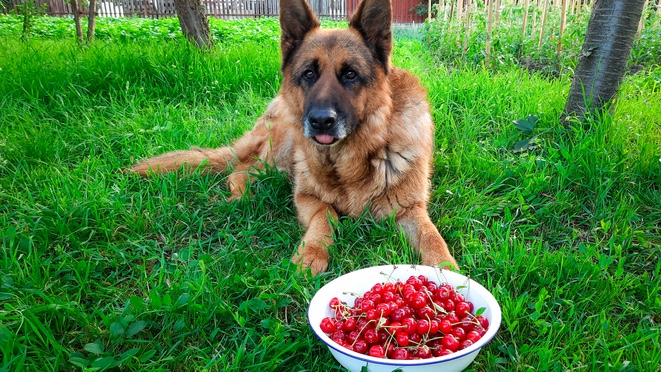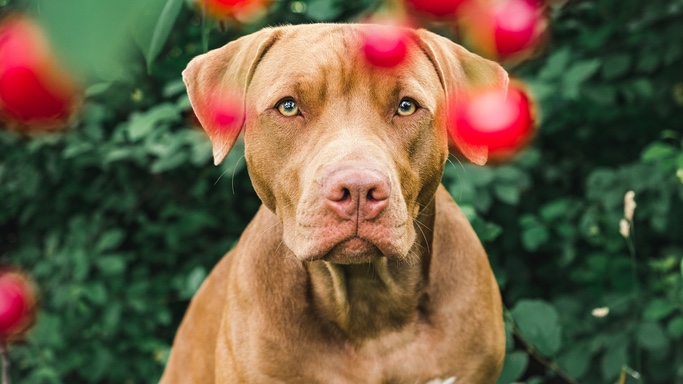Can dogs eat cherries? What's safe for your hound
This popular and tasty fruit is a sweet ingredient for people but the question is: can dogs eat cherries, too?

Can dogs eat cherries? It's a question that's often asked because many of us love the taste of this small fruit. We use them as ingredients in cakes and pies or eat them entirely on their own, while enjoying the health benefits they also bring.
But that's us. Dogs are different and when we ask what human food can dogs eat?, we are often surprised that what's good for us isn't necessarily great for them.
Indeed, when choosing healthy dog treats, we need to be careful. In supplementing dog food, we certainly don't want to be causing harm.
And sadly, that's exactly what we'd be doing if we fed cherries to our canine companions. Unfortunately our beloved bundles of fluff can't consume this mouth-watering fruit due to the risk the pits and stems pose. Even if you removed these and just fed your dog the flesh, this fruit tends to cause an upset stomach and needs to be avoided.
To learn more about the risks that cherries pose to your dog's health, read on...
Are cherries good for dogs?
Cherries are a good food for humans. They are low in calories, packed with nutrients, full of fiber and boast vitamins C, A and K.
They are also said to have anti-inflammatory benefits, help to reduce blood pressure and help us to to sleep. But should you feed them to dogs? The simple answer to that is it's a big fat no!
The main problem lies within the fruit's pits, stems and leaves although the cherries themselves don't tend to go down too well either and often cause an upset stomach. So while cherries appear to be full of goodness on the face of it (and are fine to eat yourself), you really should banish any thoughts of giving them to a dog.
In fact, you should store cherries in a cupboard, out of any dogs' sight, just in case they decide to taste the fruit themselves. After all, accidents can and do happen and it's best to slip cherries out of harm's way.
You can rest easier if a manufactured dog food contains cherries because they'll be stripped of the most harmful parts and used sparingly but is it best to avoid this fridge favorite altogether.
Why are cherries bad for dogs?
It may surprise you to learn that a cherry's pits, stems and leaves contain cyanide – a rapidly acting, potentially lethal poison that prevents a body's cells from using oxygen.
On top of that, the cherry pits pose a risk of their own, either through choking or potentially becoming lodged in a dog's digestive tract and causing an intestinal obstruction. Perhaps you could cut away the pits, stems and leaves, then, or maybe opt for cherries without pits such as Maraschinos.
If you do, the risks are dramatically reduced and yet it's not actually worth the hassle and it's not even beneficial. While cherries are nutritious, a dog would need to eat loads of them in order to make any positive difference to their health. And since they contains lots of sugar, this could put them at risk of diabetes and obesity.

What to do if your dog eats cherries?
A lot depends on how much a dog eats. If your dog ends up scoffing one or two cherries – even with the pits, stems and leaves intact – there's a very slim chance they're going to become acutely ill.
You should, however, keen an eye on your pet for the next 24 hours or so for signs of a change in their bowel habits. If there's a blockage, your dog may suffer constipation or poop less. They may have a decreased appetite or vomit.
Too many cherries with pits, stems and leaves, however, and you should be seeking the immediate advice of a veterinarian because there is a strong chance of cyanide poisoning.
It can take less than 20 minutes for symptoms to appear and these include drooling, rapid and difficult breathing, a fast heartbeat, watery eyes, vomiting and muscle spasm. A dog's gums can become bright red and their pupils can dilate. It's a serious matter and needs urgent attention.
Summary
It's always better to be safe than sorry so rather than go to the trouble of cutting away a cherry's pits, stems and leaves, it's wiser to just avoid giving a dog this fruit in the first place. There are plenty of alternatives out there and it simply isn't worth the risk.
PetsRadar Newsletter
Get the best advice, tips and top tech for your beloved Pets

David Crookes has been a journalist for almost 30 years and he has written for a host of magazines, newspapers, websites and books including the World of Animals Annual, BBC Earth, Live Science, The Independent and Tom’s Guide.
Born in England, he lives with two cats but he’s also keenly interested in the differences between the huge number of dog breeds – in fact, you can read many of his breed guides that he’s written in collaboration with vets here on PetsRadar.
With a lifelong passion for technology, too, he’s always on the lookout for useful devices that will allow people to keep their pets happier and healthier, and provide them more time to spend together.
David has a degree from Durham University, as well as postgraduate diploma in journalism from the University of Central Lancashire.
